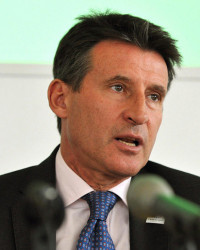LONDON, (Reuters) – The two scientists whose analysis of leaked anti-doping data from the IAAF’s database has thrown athletics into crisis defended their findings yesterday after their claims were rubbished by the world governing body.

A report in British newspaper The Sunday Times and by German broadcaster ARD/WDR at the weekend accused the IAAF (International Association of Athletics Federations) of failing to investigate hundreds of “suspicious” drug tests between 2001 and 2012, including many Olympic and world championship medal winners.
The two media outlets claimed the data pointed to widespread blood doping in athletics.
Meanwhile IAAF vice-president Sebastian Coe, who is bidding to become the organisation’s president, said yesteray the claims were “a declaration of war” on athletics.
“I don’t think anyone should underestimate the anger which is felt in our sport in the betrayal of the last few days of our sport,” Coe, who won gold in the 1,500 m race at the 1980 and 1984 Olympic Games, told the BBC.
“We have led the way on out-of-competition independent testing, we have led the way on laboratories, we were the first sport to have arbitration panels, we introduced blood passports in 2009 because we wanted to elevate the science around weeding out the cheats,” Coe said.
The IAAF labelled the reports “sensationalist and confusing” on Tuesday, insisting the data used had not been secret and had been used in a report published by WADA four years ago.
Australian blood experts Michael Ashenden and Robin Parisotto, who interpreted data, refuted the suggestion that they lacked sufficient knowledge of the IAAF programme.
In a joint statement, they said Parisotto had worked with the Russian Anti-Doping Agency to review blood profiles and Ashenden was a member of the World Anti-Doping Agency (WADA) Passport Committee that devised targeting strategies for sporting federations.
“Both advised anti-doping organisations on how to undertake target testing of athletes suspected of blood doping,” the statement said.
They also countered the IAAF’s claim that a large proportion of the blood samples were collected before the introduction of Athlete Biological Passports (ABP) in 2009 and therefore could not be used as proof of doping. The pre-2009 data was reliable, they said.
“We stand by the evaluations we submitted to Sunday Times and ARD/WDR,” they said.
INTENSE EMBARRASMENT
The sport of track and field has been plagued by spectacular doping cases over the past three decades, involving some of the biggest stars in the sport, including Ben Johnson and Marion Jones, who were both stripped of Olympic golds.
The latest storm comes just weeks before the world championships in Beijing and the vote for the IAAF’s new president — a race between Coe and fellow IAAF vice-president Sergei Bubka, the 1988 Olympic pole vault champion.
The 58-year-old Coe said the governing body has a strong track record in rooting out cheats.
“We have got some of the highest profile names out of the sport in the last few years,” he said. “This has caused us intense embarrassment but we have always taken the view that we would rather have short-term embarrassment and protect the clean athletes.”
He poured scorn on the idea that the IAAF had not shared blood-testing data with the World Anti-Doping Agency.
“The assumption that we are not sharing this information is wholly false,” he said.
Bubka took a more conciliatory tone.
“Athletics is the most fundamental of all sports and the way the world sees athletics influences the way it views all sports,” he said in a statement. “We must be more proactive and even more transparent in our aggressive pursuit of a zero tolerance policy against doping cheats.”
The World Anti-Doping Agency also condemned the leak of information and said it did not come from its own files.









